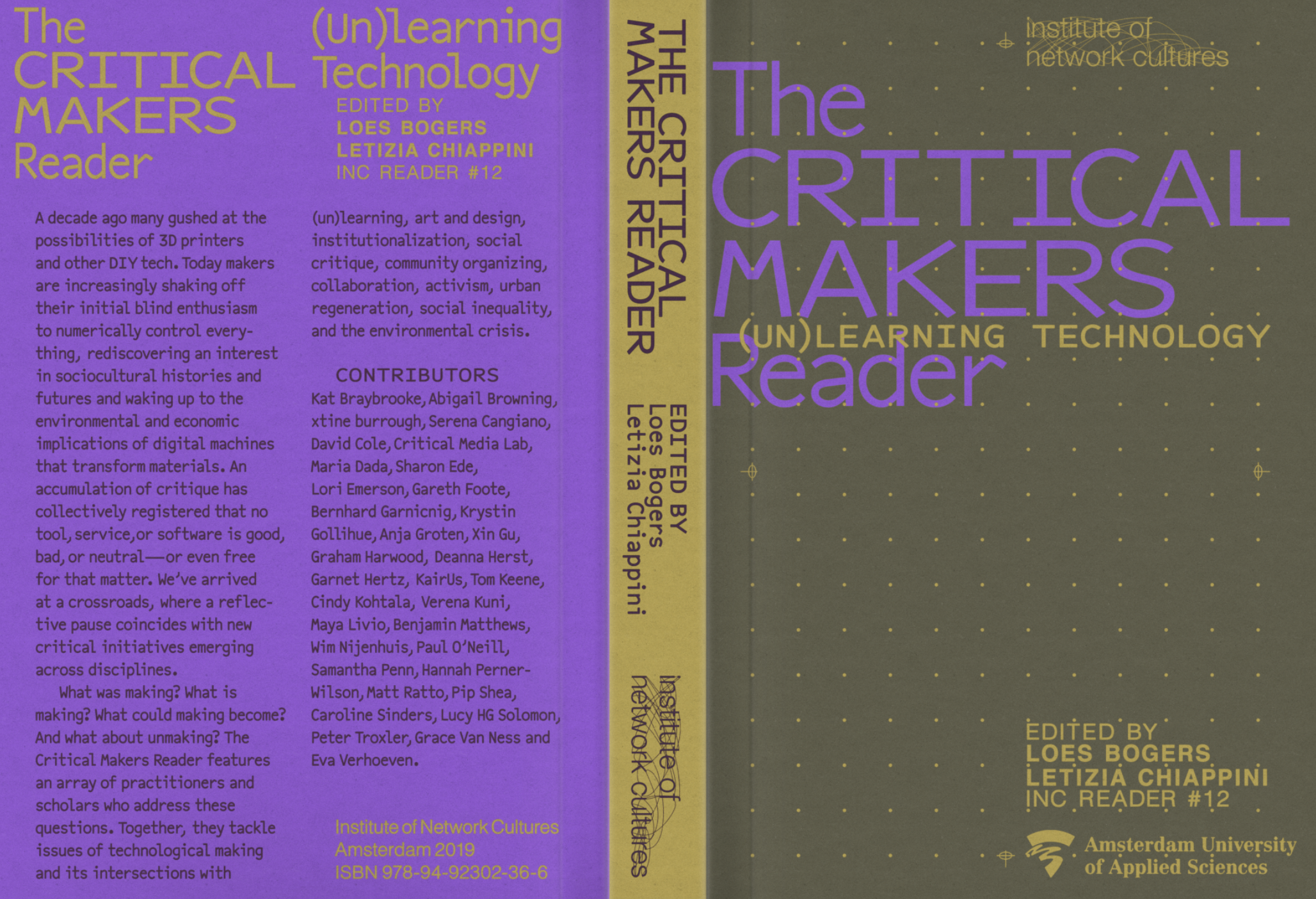Book Launch: The Critical Makers Reader: Difference between revisions
No edit summary |
|||
| (One intermediate revision by the same user not shown) | |||
| Line 5: | Line 5: | ||
|Time=20:00-21:30 | |Time=20:00-21:30 | ||
|PeopleOrganisations=Institute of Network Cultures, Loes Bogers, Letizia Chiappini | |PeopleOrganisations=Institute of Network Cultures, Loes Bogers, Letizia Chiappini | ||
|Type= | |Type=Presentation | ||
|Web=Yes | |Web=Yes | ||
|Print=No | |Print=No | ||
Latest revision as of 01:49, 12 September 2024
| Book Launch: The Critical Makers Reader | |
|---|---|
| Name | Book Launch: Critical Makers Reader |
| Location | Waag Society |
| Date | 2019/11/21 |
| Time | 20:00-21:30 |
| PeopleOrganisations | Institute of Network Cultures, Loes Bogers, Letizia Chiappini |
| Type | Presentation |
| Web | Yes |
| No | |
The Critical Makers Reader: (Un)learning Technology
Order a paper copy on the website of INC

During the Critical Making evening #2 Loes Bogers and Letizia Chiappini will launch the long awaited Critical Makers Reader: (Un)learning Technology with presentations of Anja Groten, Deanna Herst and Wim Nijenhuis. The Critical Makers Reader brings together questions and reflections that arise “at the intersections of maker culture, critically applied research methodologies, interdisciplinary collaborative practice and emancipatory pedagogies and the commons.”
The evening is moderated by Lucas Evers.
Critical Making
Critical Making evenings happen in the context of NWO supported project Bridging art, design and technology though Critical Making, a collaboration between Anja Groten, Shailoh Philips, Pia Louwerens, Dani Ploeger and Janneke Wesseling (PhD’Arts, Leiden University, Royal Academy of Fine Arts) Florian Cramer (Willem De Kooning Academy), Marie-Jose Sondijker (West Den Haag), Klaas Kuitenbrouwer (Het Nieuwe Instituut) and Lucas Evers (Waag).
Bridging art, design and technology through critical making aims to understand how art, design and technology can fullfill a critical and reflexive role in society, including the possibility of revealing and challenging power relations. The project asks whether aesthetics can play a role beyond the superficial aesthetics of consumer culture and most important can Critical Making be truly critical by overcoming the industry logic of techno-optimistic makeability?
About the book
A decade ago many gushed at the possibilities of 3D printers and other DIY tech. Today makers are increasingly shaking off their initial blind enthusiasm to numerically control everything, rediscovering an interest in sociocultural histories and futures and waking up to the environmental and economic implications of digital machines that transform materials. An accumulation of critique has collectively registered that no tool, service, or software is good, bad, or neutral—or even free for that matter. We’ve arrived at a crossroads, where a reflective pause coincides with new critical initiatives emerging across disciplines.
What was making? What is making? What could making become? And what about unmaking? The Critical Makers Reader features an array of practitioners and scholars who address these questions. Together, they tackle issues of technological making and its intersections with (un)learning, art and design, institutionalization, social critique, community organizing, collaboration, activism, urban regeneration, social inequality, and the environmental crisis.
Contributors: Kat Braybrooke, Abigail Browning, xtine burrough, Serena Cangiano, David Cole, Critical Media Lab, Maria Dada, Sharon Ede, Lori Emerson, Gareth Foote, Bernhard Garnicnig, Krystin Gollihue, Anja Groten, Xin Gu, Graham Harwood, Deanna Herst, Garnet Hertz, KairUs, Tom Keene, Cindy Kohtala, Verena Kuni, Maya Livio, Benjamin Matthews, Wim Nijenhuis, Paul O’Neill, Samantha Penn, Hannah Perner-Wilson, Matt Ratto, Pip Shea, Caroline Sinders, Lucy HG Solomon, Peter Troxler, Grace Van Ness, and Eva Verhoeven.
Colophon:
Editors: Loes Bogers & Letizia Chiappini
Copy editor: Luke Munn
Cover design: Samuli Saarinen
Design and EPUB development: Loes Bogers
Published by the Institute of Network Cultures, Amsterdam, 2019.
ISBN/EAN Paperback: 978-94-92302-36-6
ISBN EPUB: 978-94-92302-37-3
This publication is licensed under the Creative Commons
Attribution-NonCommercial-NoDerrivatives 4.0 International (CC BY-NC-SA 4.0)